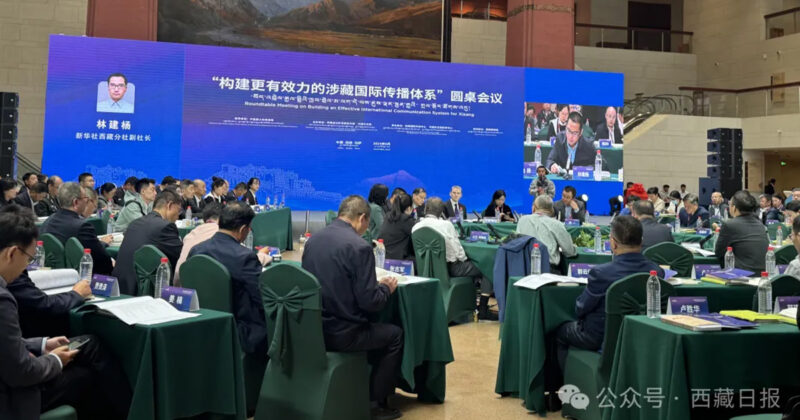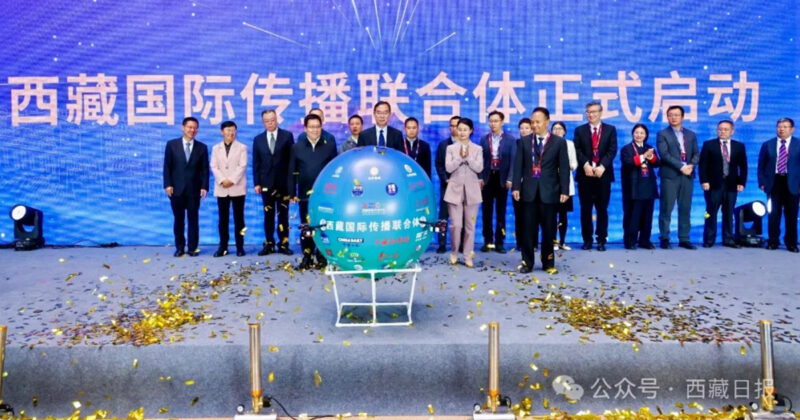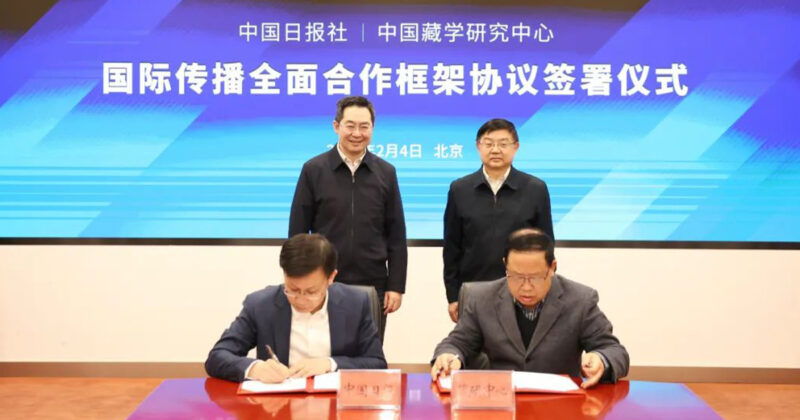In the latest escalation of China’s efforts to control the narrative on Tibet, a new propaganda center called the “Tibet International Communication Center” was launched in Lhasa on 2 September 2024. This development marks a significant step in China’s ongoing campaign to reshape international public opinion on Tibet.
The establishment of the Tibet International Communication Center is another step in the incremental growth of China’s propaganda on Tibet as previously analyzed in the International Campaign for Tibet’s (ICT) report, China’s external propaganda on Tibet: Erasing Tibet to ‘tell a good Chinese story,’ released early this year. ICT expects further escalation by China in the future in an attempt to dominate the global conversation with China’s propagandistic narrative and storytelling.

Propaganda strategy meeting in the Tibetan capital Lhasa in progress on 2 September 2024
Telling China’s story
The latest propaganda center was established during the “Roundtable Meeting on Building an Effective International Communication System for Tibet,” which was jointly organized by the Propaganda Department of the Tibet Autonomous Region Party Committee and the China Foreign Language Bureau. This center is an outcome of the group study session of the Political Bureau of the CCP Central Committee in May 2021. The immediate outcome of the Politburo CCP Central Committee appears to be the party-state’s push to replace the internationally recognized country name “Tibet” with the sinicized term “Xizang” in global conversation. This renaming policy, discreetly initiated in fall 2021 during the height of the COVID-19 pandemic, aligns with CCP General Secretary Xi Jinping’s decade-old vision to “tell a good Chinese story” on the global stage.
Following the establishment of the new propaganda center, the CCP’s top leader in the Tibet Autonomous Region emphasized increased external propaganda on Tibet. The state media Tibet Daily reported TAR Party Secretary Wang Junzheng stressing on the ideological guidance in stating that “external propaganda is an important part of the cause of the Party and the country. We must adhere to the guidance of Xi Jinping’s cultural thought, thoroughly implement General Secretary Xi Jinping’s important expositions on external propaganda, fully and accurately implement General Secretary Xi Jinping’s important instructions on Tibet work and the Party’s Tibet governance strategy in the new era.” Specific instructions were also transmitted to the CCP committees at all levels to prioritize the external propaganda work. Wang instructed resource integration and optimization of the external propaganda system and mechanisms to “build a foreign discourse system and narrative system related to Tibet” in accordance with the CCP central leadership’s order.

Official launch of the “Tibet International Communication Center” to boost China’s propaganda on Tibet
Expected Future Developments
ICT anticipates a significant escalation in China’s efforts to dominate the global conversation on Tibet. This strategy is expected to unfold through several key channels in China’s “multi-channel, three-dimensional external communication” strategy:
Leveraging State-Controlled Media
China is likely to intensify its use of state-controlled global media platforms to disseminate its narrative on Tibet. In February 2024, state media China Daily signed an agreement with the China Tibetology Research Center (an entity under the control of the CCP’s United Front) to “jointly establish the Tibetology International Communication Center and carry out in-depth cooperation in the production of international communication products related to Tibet, platform construction, and talent training.” The China Global Television Network (CGTN), as part of the China Media Group, operates under the direct control of the Central Propaganda Department of the Chinese Communist Party and is expected to have a role in this propaganda initiative. This positioning allows for the strategic dissemination of China’s perspective on Tibetan issues to a global audience.

Qu Yingpu, President and Editor-in-Chief of China Daily (back row, first from left), and Chen Zongrong, Party Secretary of the China Tibetology Research Center seen at the signing ceremony to establish the Tibetology International Communication Center in February 2024
Quotes carried by the Chinese state media reporting on the propaganda roundtable in Lhasa indicate China’s external propaganda to focus on “story telling” unlike the past focus on data driven propaganda. David Ferguson, a foreign propaganda hire and editor of the English versions of “Xi Jinping: The Governance of China,” advises China’s propaganda to focus on “story telling” of external propaganda narratives as a superior tactic than “monotonous data” driven propaganda to “win attention and hearts around the world.”
Chinese academics Zhan Xun and Zhao Lifang advised China to use “overseas new media platforms, and use vlogs, short videos and other means” to spread China’s propaganda on Tibet in terms of content and form. These and other tactics were also discussed during the Chinese conference in Lhasa to tell “Tibetan chapter of the Chinese story in a more effective and contemporary way”; a phrasing consistent with China’s overall approach to external propaganda, which emphasizes presenting a positive narrative about China’s governance of Tibet.
Pressure on International Bodies and expansion of “cultural and educational programs”
International organizations and governments are expected to face increased pressure to adopt China’s narrative on Tibet. This may include diplomatic efforts to influence policy decisions and public statements regarding Tibet’s status and relationship with China.
China is anticipated to broaden its “cultural and educational” initiatives that present a China-centric view of Tibetan history and culture. These programs are likely to be part of the party-state’s implementation of “construction of a multi-channel, three-dimensional external communication” strategy.
Implications and Concerns
ICT is concerned that the Chinese Communist Party’s intensified propaganda efforts may further marginalize Tibetan voices and obscure the ongoing oppression in Tibet. This concern is well-founded, given China’s extensive use of modern technology and media platforms to control information and shape narratives about Tibet.
ICT calls on the international community to critically examine China’s propaganda efforts in the international forum. China has been actively working to influence global conversation on Tibet through various means, including academic symposiums, international forums, and media campaigns. The push to counter China’s narrative of “high-quality development” in Tibet is particularly important, as this term is often used to gloss over human rights concerns and cultural suppression.
ICT commends the UN human rights experts most recent communication demanding answers regarding China’s repression of dam protests in Tibet in light of the Kamtok (Chinese: Gangtuo) dam protest in Derge, eastern Tibet, which occurred earlier this year. Such international scrutiny is vital in challenging China’s narrative and bringing attention to the realities on the ground in Tibet.